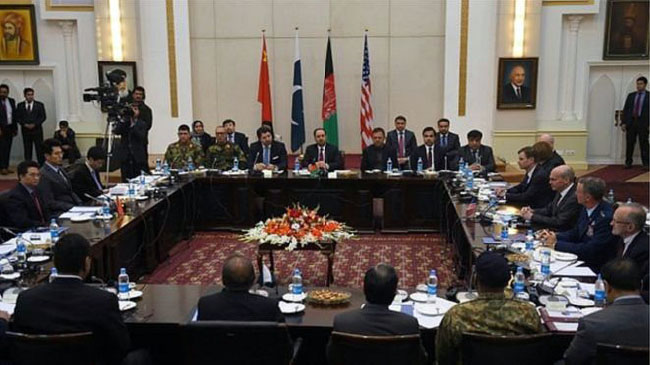The issue of peace talks has been ambiguous. Much was said about the relations among key players in peace process like Afghanistan, Pakistan, and the US and the Taliban’s approach toward the negotiation of peace, which was suspended and resumed several times. In case of coming to fruition, peace talks will be a pyric victory for Afghanistan.
The Quadrilateral Coordination Group (QCG) comprising of Afghanistan, Pakistan, China, and the US held a meeting last month in Muscat, Oman’s capital, to bring the Taliban to the table of negotiation. Following the death of Omar’s successor Mullah Mansour, a disagreement emerged between Washington and Islamabad that left no room for QCG meeting. However, the last meeting was held after the US President Donald Trump declared his strategy about Afghanistan and South Asia saying that “Pakistan often gives safe haven to agents of chaos, violence, and terror.”
In his recent trip to Islamabad, US Secretary of State Rex Tillerson maintained that he had visited Pakistan to say that Washington is determined to eradicate terrorism from the region with their support or “in a different way” and Washington would implement its strategy with or without Islamabad, which means through peace or war.
Following the meeting between Rex Tillerson and Pakistani officials, Pakistan Foreign Minister Khawaja Asif denied the allegations against Pakistan of offering safe havens to terrorists and protecting the Haqqani network. He also said that the Pakistani side told the American delegation that they should allow their policymakers, and not their military leaders, to device a policy for Afghanistan as the military solution has failed and a political solution is needed. While briefing the Senate, Asif said that the Pakistani side had told the visiting delegation that the influence Pakistan once had over the Taliban has now diminished.
The Afghan-Pak relation is also in fluctuation. However, the last QCG meeting suggests that the mutual relation between two countries is beginning to thaw. Recently, President Muhammad Ashraf Ghani said that Kabul government has always left the door open to Pakistan for negotiations and the decision lies with Pakistan whether to cooperate positively for regional peace or not.
According to reports, Hizb-e-Islami Afghanistan (HIA) led by Gulbuddin Hekmatyar declared its support to the new strategy. Hekmatyar says he was ready for any kind of assistance to the peace process in order to bring to a complete halt to the war and violence in the country.
HIA stopped its militancy against the government and joined peace process during Ghani’s administration. The party’s leader constantly asked the Taliban to join peace, which was turned a deaf ear by the Taliban. It is believed that Hekmatyar does not carry much weight in this regard and will bring no changes in the country’s stability. Before joining peace process, his men had sporadic clashes with the Taliban militants. What if he himself is the Taliban’s target?
All the key players need to play their role in terms of peace process with bona fide intention. It is self-explanatory that peace negotiation was as fruitless as war on terror. Persisting on peace without practical step will be doomed to failure. For instance, Afghan government has currently focused the bulk of its attention on peace talks, whereas the Taliban have intensified their attacks against Afghan soldiers and civilians.
All the countries have to adopt strategies regarding terrorism in accordance with time and condition. For example, when the Taliban remain adamantly opposed to peace talks, persisting on this issue will not bear the desired result. All the roots of terrorism ought to be figured out and eradicated. There are three significant issues to be considered in fighting terrorism: First, the radical ideology of warring factions, mainly the Taliban, should be condemned by religious scholars from around the world. That is to say, all Islamic clergy from different countries, including Afghanistan, Pakistan, Iran, Saudi Arabia, and Egypt, should condemn the Taliban’s practices and mentalities through media and press.
Second, the Taliban’s financial support must be cut off. Cultivating and trafficking narcotic drug seem to be the main reason behind the protracted war in Afghanistan. The Taliban’s deafening silence toward the cultivation of narcotic drug suggest that they reap the benefit. In short, the Taliban never issue fatwa against cultivation of narcotic drug although it is in conflict with Islamic tenets.
Third, military deal will be the only viable option if the Taliban do not succumb to peace talks. So, the key players have to adopt a unanimous decision to launch attacks against the safe havens of the Taliban and leave no room for the spread of their ideology or militant activities. Obliterating the Taliban’s safe havens is possible with the support of intelligence.
With a spate of suicide bombing, there is no gleam of hope for peace talks. Afghan people are being sacrificed every day. Violence and bloodshed continue in spite of the fact that Afghan government seeks peace through diplomatic way. The “an eye for an eye” strategy will be effective.
Home » Opinion » The Bombastic Peace Talks
The Bombastic Peace Talks
| Hujjatullah Zia

